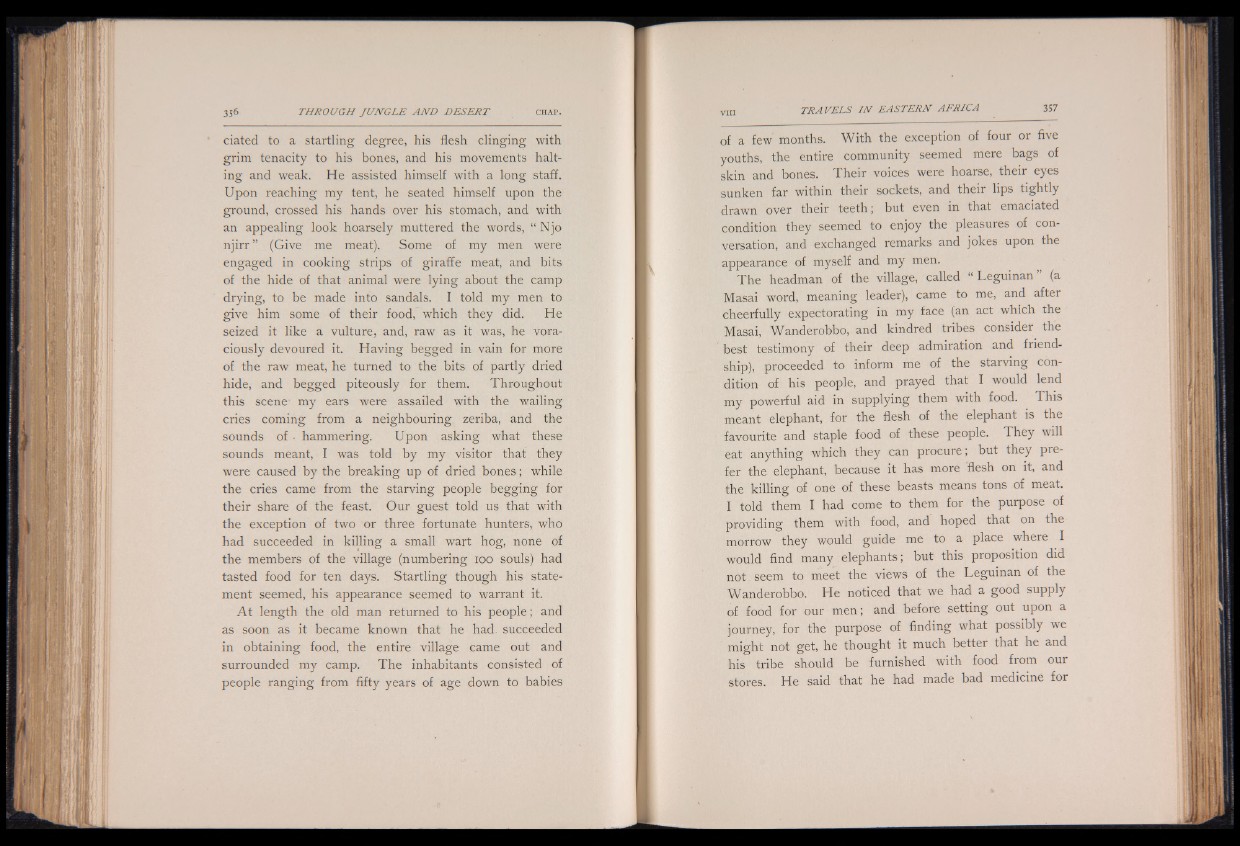
ciated to a startling degree, his flesh clinging with
grim tenacity to his bones, and his movements halting
and weak. He assisted himself with a long staff.
Upon reaching my tent, he seated himself upon the
ground, crossed his hands over his stomach, and with
an appealing look hoarsely muttered the words, “ Njo
njirr” (Give me meat). Some of my men were
engaged in cooking strips of giraffe meat, and bits
of the hide of that animal were lying about the camp
drying, to be made into sandals. I told my men to
give him some of their food, which they did. He
seized it like a vulture, and, raw as it was, he voraciously
devoured it. Having begged in vain for more
of the raw meat, he turned to the bits of partly dried
hide, and begged piteously for them. Throughout
this scene my ears were assailed with the wailing
cries coming from a neighbouring zeriba, and the
sounds of • hammering. Upon asking what these
sounds meant, I was told by my visitor that they
were caused by the breaking up of dried bones; while
the cries came from the starving people begging for
their share of the feast. Our guest told us that with
the exception of two or three fortunate hunters, who
had succeeded in killing a small wart hog, none of
the members of the village (numbering 100 souls) had
tasted food for ten days. Startling though his statement
seemed, his appearance seemed to warrant it.
A t length the old man returned to his people; and
as soon as it became known that he had succeeded
in obtaining food, the entire village came out and
surrounded my camp. The inhabitants consisted of
people ranging from fifty years of age down to babies
of a few months. With the exception of four or five
youths, the entire community seemed mere bags of
skin and bones. Their voices were hoarse, their eyes
sunken far within their sockets, and their lips tightly
drawn over their teeth ; but even in that emaciated
condition they seemed to enjoy the pleasures of conversation,
and exchanged remarks and jokes upon the
appearance of myself and my men.
The headman of the village, called “ Leguinan ” (a
Masai word, meaning leader), came to me, and after
cheerfully expectorating in my face (an act which the
Masai, Wanderobbo, and kindred tribes consider the
best testimony of their deep admiration and friendship),
proceeded to inform me of the starving condition
of his people, and prayed that I would lend
my powerful aid in supplying them with food. This
meant elephant, for the flesh of the elephant is the
favourite and staple food of these people. They will
eat anything which they can procure; but they prefer
the elephant, because it has more flesh on it, and
the killing of one of these beasts means tons of meat.
I told them I had come to them for the purpose of
providing them with food, and hoped that on the
morrow they would guide me to a place where I
would find many elephants; but this proposition did
not seem to meet the views of the Leguinan of the
Wanderobbo. He noticed that we had a good supply
of food for our men; and before setting out upon a
journey, for the purpose of finding what possibly we
might not get, he thought it much better that he and
his tribe should be furnished with food from our
stores. He said that he had made bad medicine for